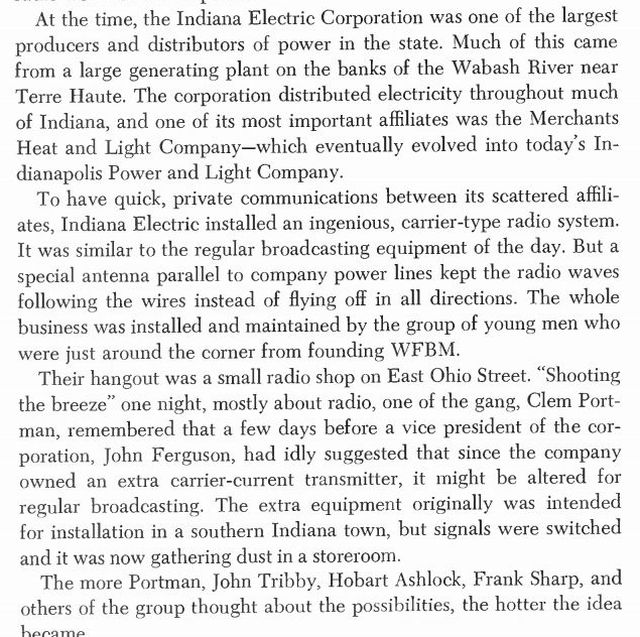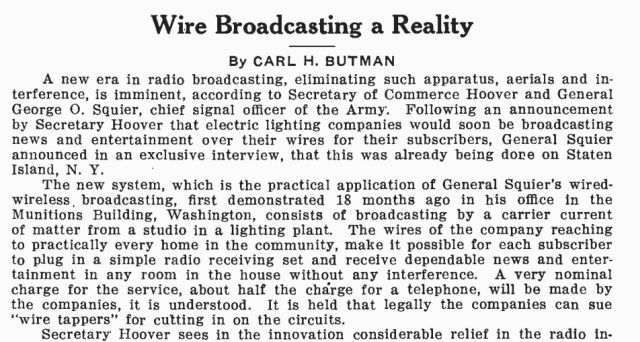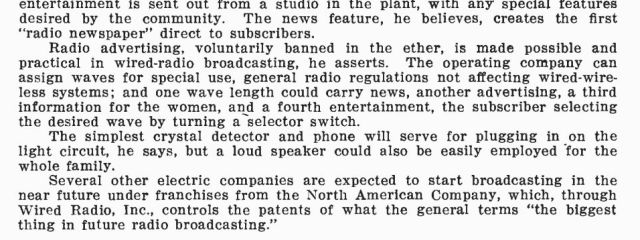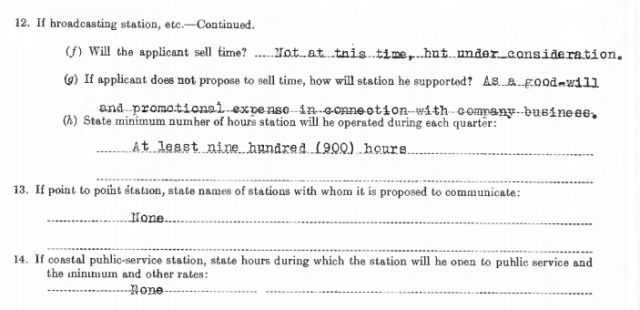Wednesday, August 14, 2019
Hawley's approach
Josh Hawley is refreshing. A crusader against the worst aspects of tech tyranny who managed to get into a position of power. Will he succeed? I doubt it. Here's an earlier battle along the same front.
= = = = = START REPRINT:
A couple weeks ago I was thinking about wired vs wireless...
 In that case the carrier system was adapted into a transmitter for airborne radio.
The idea of wired radio was ... um ... in the air at that time, and was even tried out:
In that case the carrier system was adapted into a transmitter for airborne radio.
The idea of wired radio was ... um ... in the air at that time, and was even tried out:
 General Squier, the resident genius of the Signal Corps, was pushing wired radio as an environment where advertising would be permitted:
General Squier, the resident genius of the Signal Corps, was pushing wired radio as an environment where advertising would be permitted:
 Note that Squier proposed a separate channel for advertising, which seems absurd now. It wasn't absurd then. Newspapers had (and still have!) separate PAGES for advertising. If you want to see ads, you turn to the ad section. A radio newspaper would work the same way. Squier also proposed a separate channel "for the women", which would get him tortured and hanged as a Russian MEDDLINGINTERFERINGHACKER now.
Advertising on the ether was uncomfortable and 'voluntarily banned' as WFBM's license application shows:
Note that Squier proposed a separate channel for advertising, which seems absurd now. It wasn't absurd then. Newspapers had (and still have!) separate PAGES for advertising. If you want to see ads, you turn to the ad section. A radio newspaper would work the same way. Squier also proposed a separate channel "for the women", which would get him tortured and hanged as a Russian MEDDLINGINTERFERINGHACKER now.
Advertising on the ether was uncomfortable and 'voluntarily banned' as WFBM's license application shows:
 Clearly they knew the expected response.
Why was it unfashionable? The ether was considered a public resource like a park or a street. We still consider advertising on parks or streets to be crass if not illegal, and we still have court cases about advertising on public buses. Wires were owned by the utility, which could use its output for advertising just as a printer can send out advertising in newspapers.
For radio the discomfort was already disappearing in 1924, as the easily used phrase 'sell time' reveals. Selling time was a brand new concept, never done before in any medium. Selling space in newspapers or billboards was familiar. Broadcasting was only four years old, but NYC admen had already switched dimensions, and the rest of the trade followed along.
When wired TV started in 1965, it was launched with the same fake expectation. Pay TV was going to be a subscription service, and your direct payment would protect you from all advertising. Again the expectation failed. Cable TV has just as much advertising as ether TV, often more.
And of course the same sequence happened with the web. In the original implementation as Compuserve, you were paying for a wired service with no advertising. After Berners-Lee "invented" the web again, you were still paying but you also got the privilege of unstoppable advertising and total surveillance.
= = = = = END REPRINT.
Clearly they knew the expected response.
Why was it unfashionable? The ether was considered a public resource like a park or a street. We still consider advertising on parks or streets to be crass if not illegal, and we still have court cases about advertising on public buses. Wires were owned by the utility, which could use its output for advertising just as a printer can send out advertising in newspapers.
For radio the discomfort was already disappearing in 1924, as the easily used phrase 'sell time' reveals. Selling time was a brand new concept, never done before in any medium. Selling space in newspapers or billboards was familiar. Broadcasting was only four years old, but NYC admen had already switched dimensions, and the rest of the trade followed along.
When wired TV started in 1965, it was launched with the same fake expectation. Pay TV was going to be a subscription service, and your direct payment would protect you from all advertising. Again the expectation failed. Cable TV has just as much advertising as ether TV, often more.
And of course the same sequence happened with the web. In the original implementation as Compuserve, you were paying for a wired service with no advertising. After Berners-Lee "invented" the web again, you were still paying but you also got the privilege of unstoppable advertising and total surveillance.
= = = = = END REPRINT.
In the web era we are sneakily but quickly moving toward the Jap model. Because cellphones were based on the wired phone system, they were paid and licensed 'utility connections' rather than unlicensed 'receivers'. Thus we no longer have the privilege of passive listening. BUT we're not getting the basic relationship of a rented connection either. When you pay for an AC power connection, you don't expect the AC to be modulated by advertising that forces its way into all of your light bulbs and heaters. With cellphones we're paying for zero privilege and total censorship, and we're forced to endure advertising at the same time.Broadcasting through modulated AC didn't happen, but it came a lot closer than I thought. In 1924 power companies were already using the wires for internal dispatching via modulated carriers:
 In that case the carrier system was adapted into a transmitter for airborne radio.
The idea of wired radio was ... um ... in the air at that time, and was even tried out:
In that case the carrier system was adapted into a transmitter for airborne radio.
The idea of wired radio was ... um ... in the air at that time, and was even tried out:
 General Squier, the resident genius of the Signal Corps, was pushing wired radio as an environment where advertising would be permitted:
General Squier, the resident genius of the Signal Corps, was pushing wired radio as an environment where advertising would be permitted:
 Note that Squier proposed a separate channel for advertising, which seems absurd now. It wasn't absurd then. Newspapers had (and still have!) separate PAGES for advertising. If you want to see ads, you turn to the ad section. A radio newspaper would work the same way. Squier also proposed a separate channel "for the women", which would get him tortured and hanged as a Russian MEDDLINGINTERFERINGHACKER now.
Advertising on the ether was uncomfortable and 'voluntarily banned' as WFBM's license application shows:
Note that Squier proposed a separate channel for advertising, which seems absurd now. It wasn't absurd then. Newspapers had (and still have!) separate PAGES for advertising. If you want to see ads, you turn to the ad section. A radio newspaper would work the same way. Squier also proposed a separate channel "for the women", which would get him tortured and hanged as a Russian MEDDLINGINTERFERINGHACKER now.
Advertising on the ether was uncomfortable and 'voluntarily banned' as WFBM's license application shows:
 Clearly they knew the expected response.
Why was it unfashionable? The ether was considered a public resource like a park or a street. We still consider advertising on parks or streets to be crass if not illegal, and we still have court cases about advertising on public buses. Wires were owned by the utility, which could use its output for advertising just as a printer can send out advertising in newspapers.
For radio the discomfort was already disappearing in 1924, as the easily used phrase 'sell time' reveals. Selling time was a brand new concept, never done before in any medium. Selling space in newspapers or billboards was familiar. Broadcasting was only four years old, but NYC admen had already switched dimensions, and the rest of the trade followed along.
When wired TV started in 1965, it was launched with the same fake expectation. Pay TV was going to be a subscription service, and your direct payment would protect you from all advertising. Again the expectation failed. Cable TV has just as much advertising as ether TV, often more.
And of course the same sequence happened with the web. In the original implementation as Compuserve, you were paying for a wired service with no advertising. After Berners-Lee "invented" the web again, you were still paying but you also got the privilege of unstoppable advertising and total surveillance.
= = = = = END REPRINT.
Clearly they knew the expected response.
Why was it unfashionable? The ether was considered a public resource like a park or a street. We still consider advertising on parks or streets to be crass if not illegal, and we still have court cases about advertising on public buses. Wires were owned by the utility, which could use its output for advertising just as a printer can send out advertising in newspapers.
For radio the discomfort was already disappearing in 1924, as the easily used phrase 'sell time' reveals. Selling time was a brand new concept, never done before in any medium. Selling space in newspapers or billboards was familiar. Broadcasting was only four years old, but NYC admen had already switched dimensions, and the rest of the trade followed along.
When wired TV started in 1965, it was launched with the same fake expectation. Pay TV was going to be a subscription service, and your direct payment would protect you from all advertising. Again the expectation failed. Cable TV has just as much advertising as ether TV, often more.
And of course the same sequence happened with the web. In the original implementation as Compuserve, you were paying for a wired service with no advertising. After Berners-Lee "invented" the web again, you were still paying but you also got the privilege of unstoppable advertising and total surveillance.
= = = = = END REPRINT.
